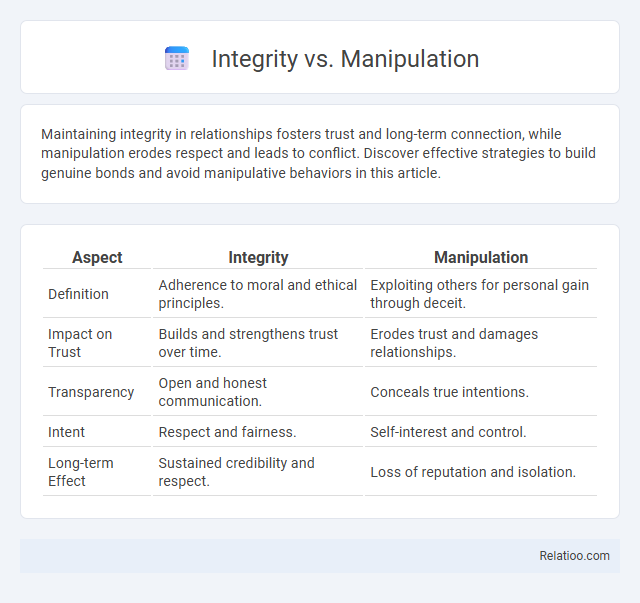Maintaining integrity in relationships fosters trust and long-term connection, while manipulation erodes respect and leads to conflict. Discover effective strategies to build genuine bonds and avoid manipulative behaviors in this article.
Table of Comparison
| Aspect | Integrity | Manipulation |
|---|---|---|
| Definition | Adherence to moral and ethical principles. | Exploiting others for personal gain through deceit. |
| Impact on Trust | Builds and strengthens trust over time. | Erodes trust and damages relationships. |
| Transparency | Open and honest communication. | Conceals true intentions. |
| Intent | Respect and fairness. | Self-interest and control. |
| Long-term Effect | Sustained credibility and respect. | Loss of reputation and isolation. |
Understanding Integrity and Manipulation
Integrity involves consistently adhering to moral and ethical principles, fostering trustworthiness and transparency in actions and communication. Manipulation exploits others' vulnerabilities through deceit or coercion to achieve hidden agendas, undermining relationships and ethical standards. Understanding these concepts is crucial for recognizing genuine integrity and identifying harmful manipulation in personal and professional contexts.
Core Principles of Integrity
Core principles of integrity include honesty, transparency, and consistency, which build trust and credibility in personal and professional relationships. You demonstrate integrity by aligning your actions with ethical standards and being accountable for your decisions. Avoiding manipulation and deception fosters a foundation of respect and genuine communication essential for long-term success.
Tactics and Signs of Manipulation
Recognizing manipulation involves identifying tactics such as gaslighting, guilt-tripping, and emotional blackmail, which distort your perception and exploit vulnerabilities. Signs include inconsistent storytelling, frequent blame-shifting, and attempts to isolate you from support systems. Developing awareness of these behaviors protects your integrity and empowers you to maintain honest, transparent interactions.
Psychological Impact on Individuals
Integrity fosters trust and self-esteem, promoting psychological well-being and resilience in individuals. Manipulation undermines autonomy and can lead to anxiety, low self-worth, and emotional distress. Deception disrupts cognitive processing and social bonds, often resulting in confusion, mistrust, and long-term psychological harm.
Integrity’s Role in Building Trust
Integrity fosters trust by ensuring honesty, consistency, and transparency in actions and communication, which are essential for establishing reliable relationships. Manipulation and deception, in contrast, undermine trust by creating doubt and skepticism, damaging reputations and social bonds. Your commitment to integrity strengthens credibility and encourages open, authentic interactions that form the foundation of lasting trust.
Manipulation’s Effects on Relationships
Manipulation undermines trust by fostering suspicion and emotional distance between individuals, leading to weakened relationships. It often causes confusion and resentment, making open communication difficult to maintain. The long-term effects include erosion of respect and a breakdown in genuine connection, harming both personal and professional bonds.
Ethical Decision-Making: Integrity vs Manipulation
Integrity in ethical decision-making ensures your actions align with honesty, transparency, and moral principles, fostering trust and credibility in personal and professional relationships. Manipulation undermines these values by using deceit and coercion to influence outcomes, often leading to long-term damage and a loss of respect. Choosing integrity over manipulation promotes sustainable success and reinforces a reputation built on ethical behavior.
Real-World Examples and Case Studies
Integrity in leadership builds trust and long-term success, as demonstrated by Warren Buffett's transparent communication and ethical investment strategies. Manipulation, seen in the Enron scandal, led to corporate collapse due to deceptive financial practices eroding stakeholder confidence. Your ability to recognize these behaviors can protect your business from reputational damage and legal consequences.
Cultivating Integrity in Personal and Professional Life
Cultivating integrity in personal and professional life involves consistently aligning actions with ethical principles, fostering trust and credibility. Transparent communication and accountability create a strong foundation that resists manipulation and deception, promoting authentic relationships and ethical decision-making. Emphasizing integrity not only enhances reputation but also drives long-term success and meaningful connections.
Overcoming Manipulation and Promoting Authenticity
Overcoming manipulation requires cultivating self-awareness and critical thinking to recognize deceptive tactics and protect personal boundaries. Promoting authenticity involves fostering transparent communication, encouraging honesty, and modeling ethical behavior in personal and professional environments. Building trust through consistent integrity creates resilience against manipulation and supports genuine relationships.

Infographic: Integrity vs Manipulation
 relatioo.com
relatioo.com